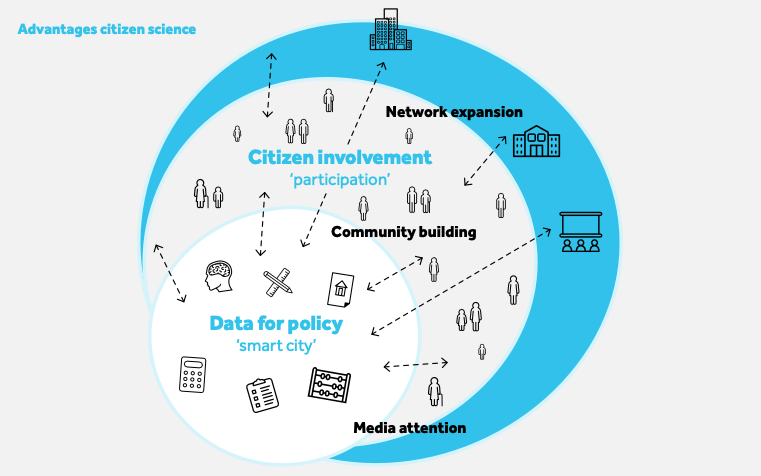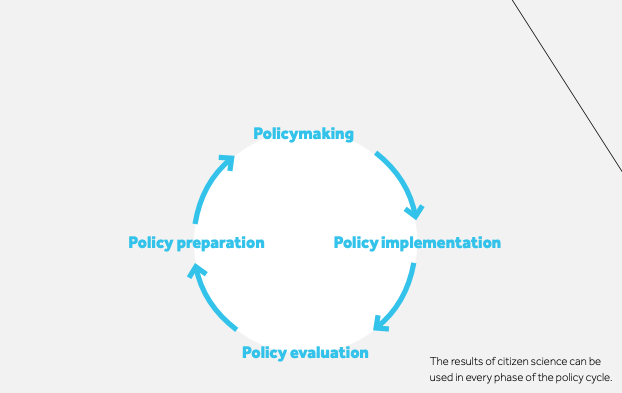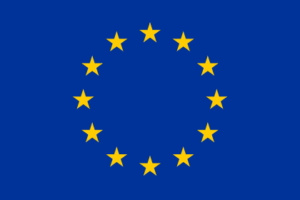Authors: Veeckman, C., Van Herck, B., Carpentier, M., Van Laer, J. & Sterken, M.
Veeckman, C., Van Herck, B., Carpentier, M., Van Laer, J. & Sterken, M., (2021). Citizen Science Roadmap for Local Government. A hands-on manual for citizen science, by and for cities and towns. SCIVIL, Leuven, Belgium.
ISBN: 9789463965668 www.scivil.be/en
What are the benefits of citizen science for local government?
In recent years, citizen science has been gaining both attention among policymakers and recognition among the general public and research institutions. In this chapter we will elaborate on why it is worthwhile for cities and towns to engage in citizen science.
The benefits of citizen science for local government are mainly situated in two areas:
- Gathering new data and insights to inform, decide and follow up on policy choices;
- Increasing citizen involvement in policy and important policy themes. For example, we now see that citizen science projects strengthen support for themes such as traffic safety, water quality, biodiversity, climate, health, etc.
- Additionally, citizen science also contributes to:
Community building: in citizen science projects, citizens work together and social cohesion is strengthened. The communities that emerge in citizen science projects can be considered as new associations;
- Network expansion: in citizen science projects, local government cooperates with knowledge institutions ((vocational) universities, research institutions,…), civil society organizations (citizen movements, associations,…), companies, and external service providers (communication agencies, technology companies,…). These new partnerships enable local government to cooperate with these parties in other areas as well;
- Media coverage: (the results of ) citizen science projects are often in the spotlight. The administration’s engagement in these projects ensures media attention for the local government and for the theme of the project.
These benefits can be visually presented in three circles. In a first circle, we see benefits for internal policymaking (additional data and insights for policy). The second circle refers to the strengthened relationship among citizens, and between citizens and the local government. The third circle concerns strengthened cooperation between local government and citizens, and other stakeholders inside and outside the city limits (knowledge institutions, social organizations, etc.).

Added value 1: collecting new data and insights for policymaking
Through citizen science, a local administration can gather additional data and insights to substantiate policymaking. As part of the management and policy cycle, the Government of Flanders demands cities and towns to base their multiannual plan on an environmental analysis and to monitor their objectives using indicators. Not every theme has ready-to-use data to comply with these requirements. Data from citizen science are an interesting addition to existing data sources and often provide new knowledge and insights about the city or town.
In particular, citizen science makes it possible to gather a lot of data in a short time, to collect more detailed data, or to collect data that would otherwise remain hidden. The cost to the city or town is usually limited as the work is done primarily by volunteers.
We like to illustrate our point about detailed data collection with two examples:
- By installing “telramen” (sensors attached to windows), both citizens and the local administration get an in-depth picture of traffic in a neighbourhood. The end result is more detailed than a result based on a few counting loops or cameras installed by the administration;
- Local data on biodiversity is virtually non-existent. Via mijntuinlab.be, citizens and local government are able to gauge the fauna and flora at micro level, right down to private gardens. The evolution of biodiversity is also valuable policy information.
Citizen science facilitates the movement towards more data-driven policy. Based on reliable data, the local government can fully carry out its governing role: slowing down, stimulating, inspiring, etc. Just like other data types, results from citizen science can be used in every phase of the policy cycle, as explained in the blue box.

Citizen science in the different phases of the policy cycle
Policy preparation: data from citizen science projects allow local government to monitor the changing environment and develop evidence- based dossiers. Some local administrations use citizen science data in the environmental analysis, or use data from Luftdaten to substantiate project proposals on mobility or climate.
Policymaking: policy decisions can be (additionally) substantiated by data from citizen science projects.
“We want to change the modal split in our city, namely cut car traffic in half and double bike traffic. Using the ‘telramen’ to assess traffic movements in the city, the local government makes informed decisions.”
– Interviewed civil servant
Policy implementation: are actions going as planned? Is the implementation on schedule? Using citizen science data, a local administration can assess the status of projects.
“We look at the CurieuzeNeuzen data multiple times per month, in order to formulate advice.”
– Interviewed civil servant
Policy evaluation: did our actions achieve our goals? Are we reaching the objectives from our multiannual plan? Using data from citizen science projects, a local administration can evaluate its policy and adjust it if needed. For example, citizen science projects investigating the heat island effect are used to monitor the impact of (local) climate policy.
Added value 2: increasing citizen involvement
A second important added value is increased involvement of citizens in policy and society. Through citizen science, local government can generate greater awareness of social issues, make more effective use of the skills and knowledge of citizens, and contribute to mutual understanding between government and citizens.
“The dialogue with citizens is at least as important as the accuracy of the data (…).”
– Interviewed civil servant
Citizen science is a way to generate awareness on important social themes. Most projects in which schools participate, explicitly play out this form of sensitization or education.
“In general, we see an increase in knowledge, awareness and ability to act in schools regarding air quality thanks to the citizen science projects.”
– Interviewed civil servant
Furthermore, citizen science can also facilitate behavioural change. Examples include changing the way we move or disconnecting rainwater from the sewage system.
Citizen science is also a form of citizen empowerment. It helps communities bring certain needs or concerns into focus, and to the attention of local government. It is a way of utilizing the knowledge and skills of citizens, sometimes in areas where there is limited expertise within the local administration.
In doing so, citizens set the agenda and stimulate local authorities to take action. As a result of the findings of the CurieuzeNeuzen project, a number of local administrations set up their own network of sensors to get a deeper understanding of the issue.
“With the data from CurieuzeNeuzen, citizens approached politicians to divert a bus line in their street. As a result, a bus line was cancelled and the street was repaved.”
– Interviewed civil servant
Citizen science can also create a better dialogue and understanding between citizens and policymakers. Throughout a citizen science project, both parties get acquainted with each other’s context. Citizens feel that they are heard and respected by their government, if attention is paid to their efforts in citizen science projects. Conversely, through their contacts with the administration, citizens gain insight in the whole context. Local governments have to take several interests into account when drawing up their policies.
Additional added values
In addition to the direct benefits (data collection, citizen engagement), citizen science also offers other potential added values.
Community building
Citizen science stimulates encounters and strengthens social cohesion within and between communities. In a sense, citizen science communities are new associations and enrich the socio-cultural fabric. Citizens use their leisure time in a meaningful way and obtain a sense of satisfaction and enjoyment throughout the process.
“Within citizen science projects, citizens listen to each other and learn to understand each other better: ‘Oh, the trucks bother him, he has children and thinks it’s a dangerous situation.”
– Interviewed civil servant
Developing partnerships
Through citizen science, a local administration broadens its network. Since most citizen science projects involve important social organizations and scientific institutions, the local government broadens itself as a network organization. Sometimes there are supralocal authorities or institutions involved like the Vlaamse Milieumaatschappij (VMM), the Instituut voor Natuur en Bos (INBO), provincial governments, … This way, a local administration establishes a better intergovernmental dynamic with other levels of government.
Via citizen science projects, the local government also builds relationships with (vocational) universities, Flemish administrations, Flemish research institutions (VITO, INBO, VLIZ,….), etc. These connections undoubtedly lead to interesting win-win situations in other fields. This network approach is consistent with the growing awareness among administrations that they are no longer able to provide answers to complex social problems on their own. Partnerships are necessary to tackle complex problems effectively.
Are you, as a member of a local administration, looking for partners, or would you like to sign up as a citizen science partner in Flanders (Belgium)? Go to the Scivil website and create a profile.
Media coverage
Citizen science projects and their results often easily attract attention. The administration’s engagement in projects can provide additional media attention for the local government and the project’s theme.
Tip: Collaborate with other local governments
Most social challenges do not stop at city borders (mobility, air quality,…). It is therefore interesting to also collect data outside the city limits. Collaborating with neighbouring towns on citizen science is most certainly an interesting idea. ‘Intercommunales’ can contribute to this kind of collaboration. For instance, the West-Flemish intercommunales WVI (‘Smart Waterland’) and Leiedal (‘Telraam’) were actively involved in citizen science projects for their member administrations.
User Type
- Policy/decision maker
Resource type
- Case studies
- Getting started
- Step by step guides
Research Field



